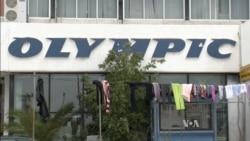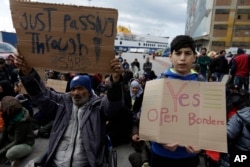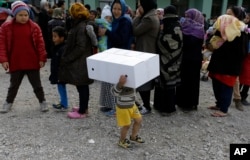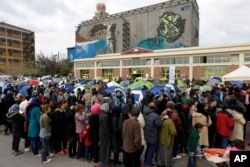At Athens’ old, disused airport, the new arrivals come not by plane but by boat, having traveled from Turkey to the Greek islands and then on to the capital.
The terminal is now a refugee camp, ill-equipped to deal with its 1,900 residents. The luggage carousels and mobile stairways are now playgrounds for the hundreds of children living at the site.
Like most of the migrants living in the airport, Farahnaz Alizade is from Afghanistan. When asked about the conditions, she broke down in tears.
“Please open the door," she said. "We going from here. We can’t stay here. It’s a very bad place. You can’t feel that, because we are here, and we know that. You are not here. You are not here. We escaped from war. And you think our country is safe? I don’t know why. I don’t know.”
The European Union and Turkey are aiming to finalize a deal this week to stop the flow of migrants traveling from the Turkish coastline to Greece. Over 100,000 people have made the journey so far this year, following hundreds of thousands of others in 2015, coming from the Mideast, Central Asia and North Africa.
The EU’s refugee relocation scheme is aimed at Syrians. The fate of other nationalities is as yet undecided. Part of Europe’s proposed deal with Ankara would see migrants here in Greece sent back to Turkey.
Alizade rejected that idea: “No, no. We will not come back to Turkey. Because Turkey is very bad, more than here.”
Different nationalities are separated into three buildings across the airport and the adjacent Olympic Park that hosted the 2004 Games. The migrants say tensions between the different nationalities are fueling frustration, and fights often break out.
With the borders to the north closed, the migrants are stuck. Valia Gkeka of the U.N. refugee agency, which is helping at the camp, said 60 percent of those arriving in Greece are women and children.
“More reception places need to be created in Greece in order to cover the needs of the population arriving and in need of international protection,” Gkeka said.
Bakhtair Hushangi, his wife and their four young children have been in the camp for two weeks. They are Kurds from Iran and say they escaped persecution back home.
He said they want to settle in Europe because the people are much better, and that they cannot live in an Islamic country. He added that they cannot go back to live in Turkey because there is fighting between Turkey and the Kurds.
Under normal European rules, those subject to persecution are able to claim asylum in the EU. But the European rulebook is being rewritten — and the future for the refugees stranded in Greece is highly uncertain.








